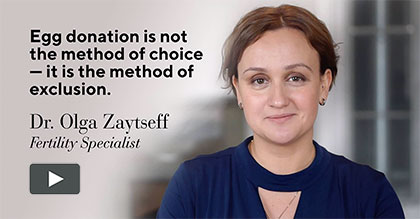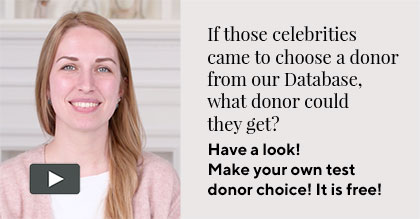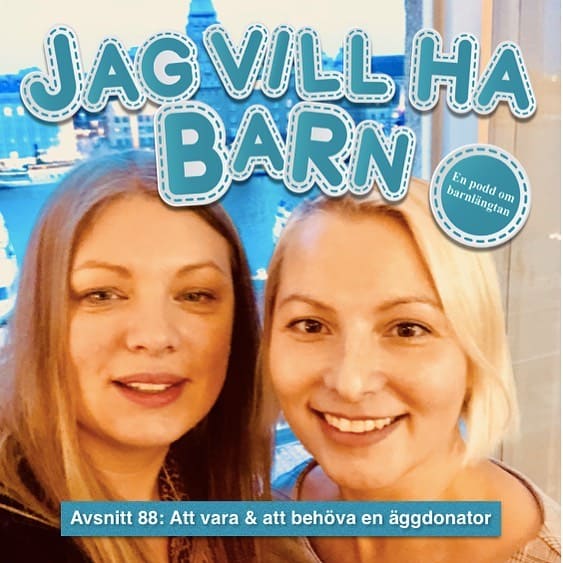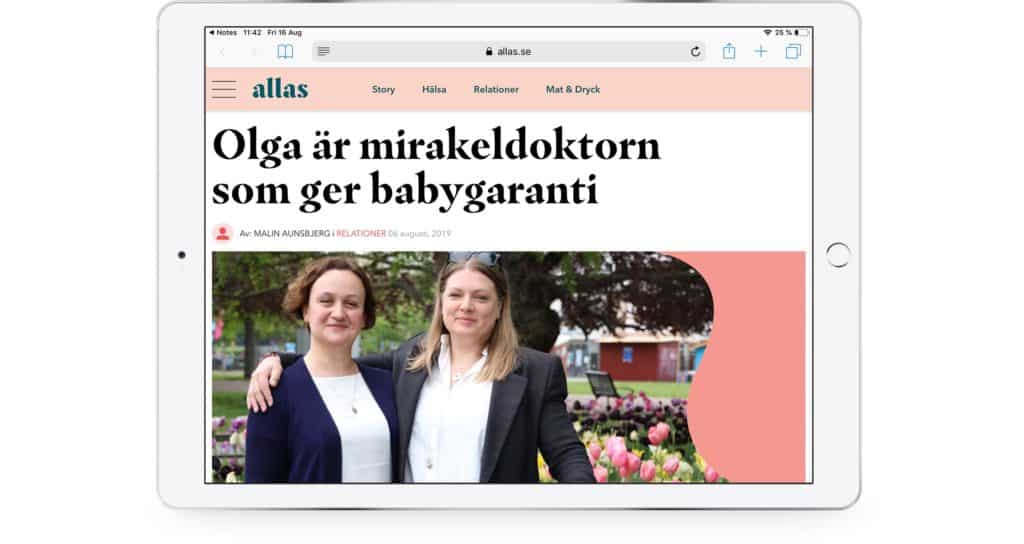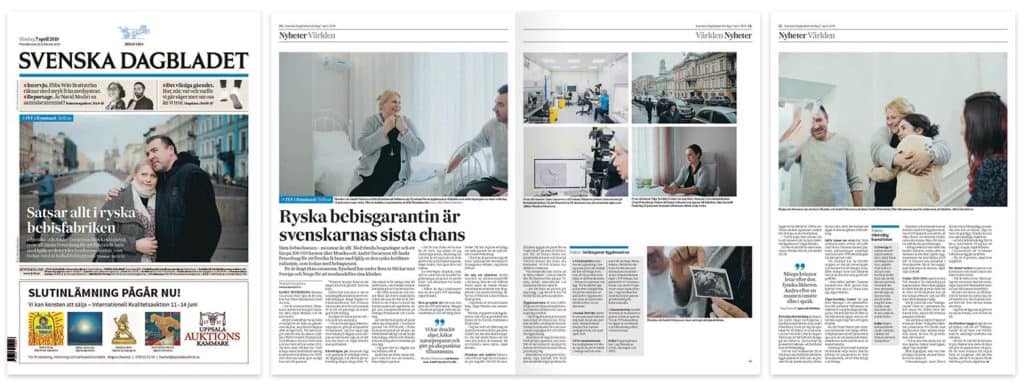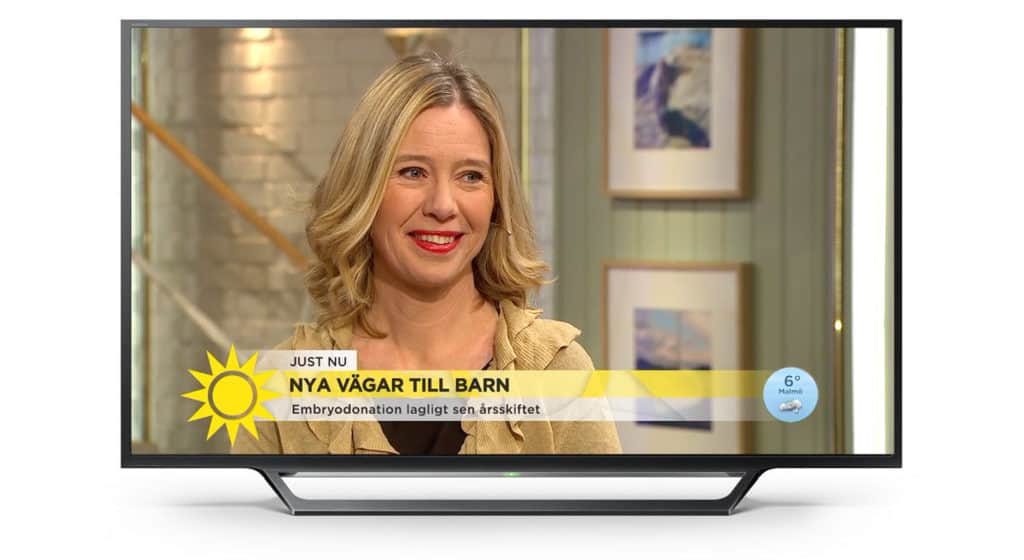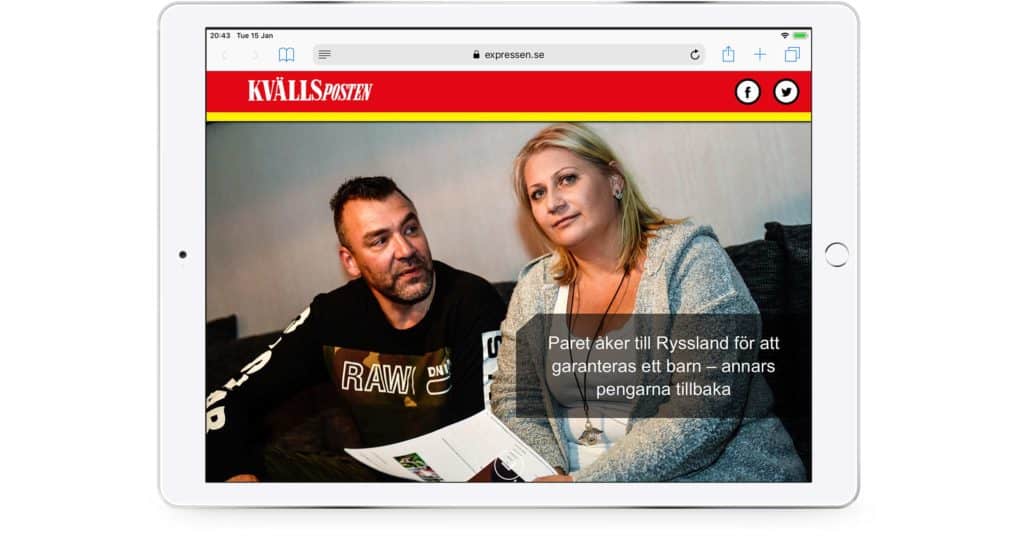"Dagens Nyheter", Sweden. 7 May 2019. Text: Sofia Edgren, Photo: Elin Åberg
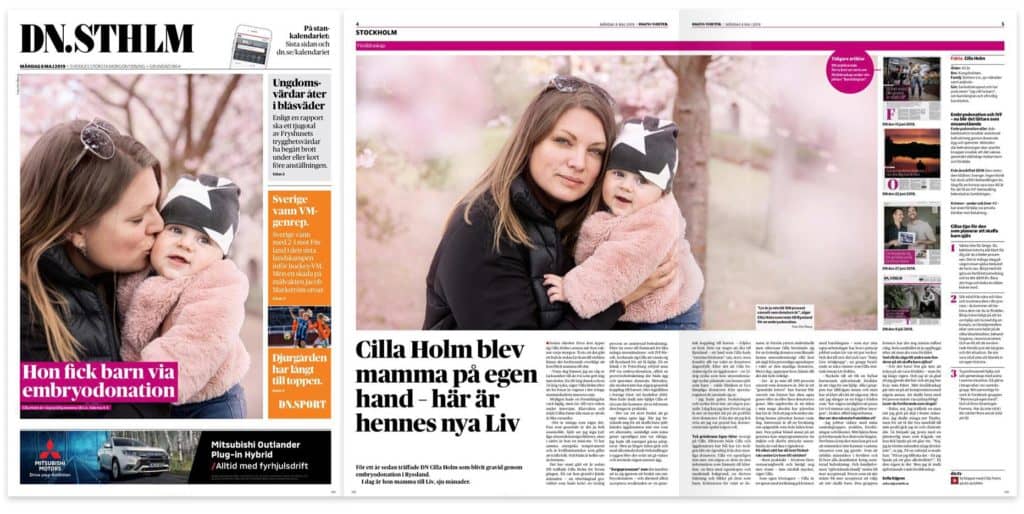
Translation to English
Cilla Holm became a mother on her own – this is her new Liv (life)
A year ago DN met Cilla Holm who had become pregnant through embryo donation in Russia. Today she is the mother of Liv, 7 months old.
Facts. Cilla Holm
Age: 43
Resident in: Kungsholmen, Stockholm
Family: Daughter Liv, seven months, and boyfriend
Work: Conversation therapist and run the pod cast “I want a baby”, about longing for children and involuntary infertility.
Embryo donation and IVF – now easier for singles
- Embryo donation or double donation means assisted fertilization with donated eggs and sperm. The method where fertilization is made outside of the body means that there is no genetic link between child and parent.
- From 1 January 2019 the method is legal in Sweden. However, so far no clinic has performed the treatment. A woman in Sweden must be under 40 years old to have an IVF-treatment paid by the public care.
- Women – under and over 40 – can also seek help in private clinics at a cost.
Since October last year Cilla Holm is pinching her arm every morning when she wakes up. Although a year has passed since Liv was born it still feels unreal to have become a mother.
– Every day I feel a wave of gratitude towards those two persons who gave me my daughter. A 20 year old Danish man and a 32 year old Russian woman, says Cilla Holm after having bumped in the stroller to the inner room of her regular café.
A morning nap would have been suitable, but Liv wants to stay awake during the interview. Wide awake and satisfied in Cillas arms it is obvious there is a big resemblance between them.
– Many people say so. But genetically it is unlikely. Personally I see no clear physical resemblances, but in her ways she is a mini-me. We have the same energetic temperament and are evening persons who like to meet people. And we both prefer to be outdoors rather than at home.
It has been a year since DN met Cilla Holm for the first time. Back then she was four months pregnant – a very much longed for pregnancy who had demanded a three year long process of assisted fertilization. After ten trips to Denmark for as many attempts with insemination and IVF, Cilla decided to turn to Russia for help. A clinic in St Petersburg offered IVF with embryo donation, which means in vitro fertilization with both donated eggs and sperm. The method, where the mother has no genetic link to the child, has been legal in Sweden only from the 1st of January 2019. However this would not have helped Cilla since it takes a long time before all the practicalities around the treatment are solved.
– It was a big decision to give up on my own eggs. When I first decided to try to have a baby on my own egg donation did not even feel as an alternative, at the same as my own genes where not really important. For example I would have been happy to adopt a child. But the more time that passed, and with all failed treatments behind me, it became difficult to continue with someone else’s eggs.
The “grief process” in taking the decision of embryo donation – and with that accepting the lack of a genetic link to the child – was followed by agony. First of all going to Russia – a country for which Cilla had “huge prejudices” – was a big step, but above all the choice of donors was distressing. After having chosen an egg donor – a 32 year old Russian woman she thought looked like her as a child – the clinic chose four suitable sperm donors from the sperm bank it was using.
– My decision anxiety was crazy and at first I didn’t think any of them was suitable. Today I can’t understand that I spent so much time on pondering over donators. From the day I got the positive pregnancy test the donors didn’t matter at all.
Two large, green-blue eyes gaze at Cilla. Since both Cilla and the egg donor have blue eyes Liv probably got the green color from the male donor. Cilla doesn’t know more about the donors than the information provided to the clinic: a list of personal properties and medical history, a letter and pictures of them as children. The criteria for choosing donors are of course very individual, but since Cilla chose a female donor that resembled her looks she wanted to choose the male donor more out of personal properties. But today, she repeats, all that feels completely unimportant.
– Liv is 100 percent mine regardless of who the donor is. It is a “genetic lottery” how children turn out, whether they have your genes or genes from one or more donors. My experience is that the time in my belly has definitely affected how Liv is. And that I and other persons around her are affecting her every day. Interesting is all new research that is published about epigenetics. It points out the fact that genes can be re-programmed by the environment and thereby be expressed in a different way than the DNA is signaling.
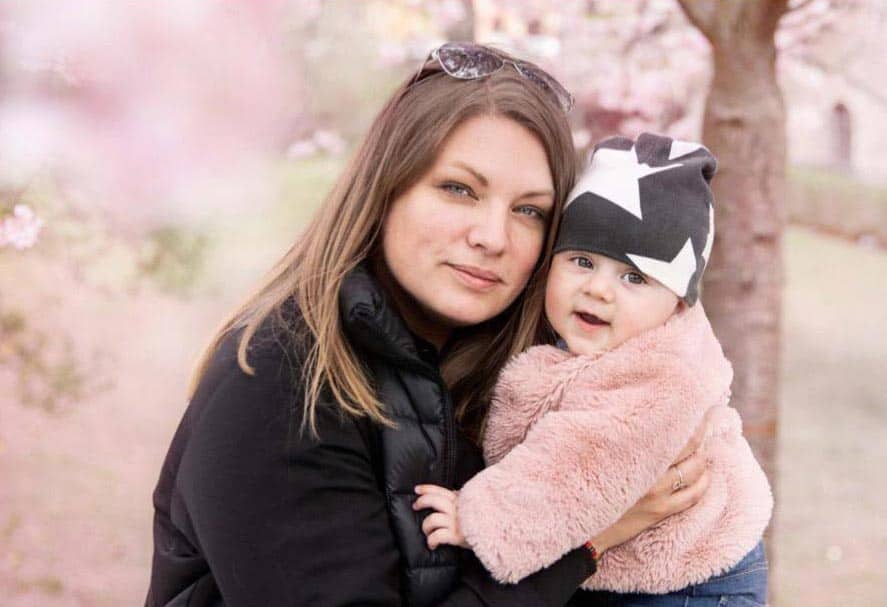
In what way has your life changed since Liv was born?
– Practically – except for fewer visits to restaurants and surprisingly more sleep – not very much, says Cilla.
Running her own business – Cilla is a therapist focusing on women longing for children –managing her own working hours she has been working more or less since Liv was a few weeks old. This is also thanks to the “Baby Liv support group” that Cilla started before Liv was born.
– The key to becoming a rather harmonic self-standing
parent is having the courage to ask for help. Everyone in the group has been asked beforehand and they always have the right to say no. But when I launch a question in the thread “does someone have the possibility to watch Liv for two hours tomorrow while I am working”, someone always says yes.
What does the closest future look like?
– I continue working with my conversation groups, the pod, lectures and my clients. My heart still lies with those who are longing. There is so much you can do for people, so that they don’t end up in the same situation as I did. Like educating people about fertility and take away all shame hats connected to assisted fertilization. And the family structure “self-standing family” has to be more accepted. Just like it has to be more accepted to choose not to have children. That group of women is probably having the hardest time today, as our whole society is shaped around expectations of being a parent.
What would you like to say to persons who consider having children on their own?
– Just do it! You can’t practice being a parent – you learn by doing. And I am so happy I did this and still have my freedom. My parenthood is not about compromising with someone else. Having children with the wrong person must be very tough.
Are you still single?
– Ha ha, no. I met a man when I went on a date while I was five months pregnant. I was about to close down Tinder, but to get some good material for my pod I entered a chat. I started talking to a very nice man who asked if he could offer me a glass of wine. “No, I am five months pregnant so I don’t drink”, I said. After one second he answered: “In that case I take it back – can I offer you a glass of non-alcoholic wine?” So it is. But I am still self-standing in my parenthood.
Cilla's advices for those who are planning to have children on their own
- Do not wait too long. You don´t need to know everything while starting the process. There are many steps before the permanent decision is made. Begin with a fertility investigation and continue from there. Just to call and make such a booking takes courage.
- Seek support from relatives and friends and involve them in your process – you will need them when you are a parent. Start early to practice asking for help and bring a friend, a family member or anyone to the various meetings with doctors, treatments, travels etc. And make sure that those involved understand exactly your longing and situation. They should be a support without mixing up with their own history.
- Seek professional help and community with others in the same situation. It might be a good idea to see a therapist or enter a conversation group. My personal favorite is the Facebook-group “Mum on my own”. There is also the association Femmis. If you don’t have support in your closest surroundings there is other support available!


